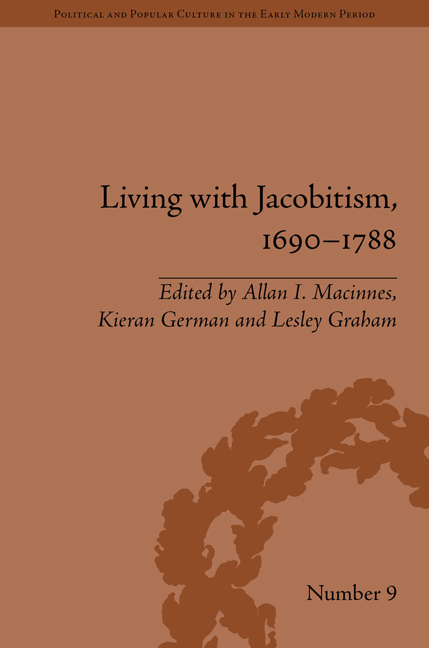Book contents
- Frontmatter
- CONTENTS
- List of Contributors
- List of Figures
- Abbreviations
- Preface: Breandán Ó Buachalla, A Tribute
- Introduction: Living with Jacobitism
- 1 The First Jacobite and the Scottish Parliament
- 2 The Scottish Jacobite Community at Saint-Germain after the Departure of the Stuart Court
- 3 Liturgy: The Sacramental Soul of Jacobitism
- 4 ‘Zealous in the Defence of the Protestant Religion and Liberty’: The Making of Whig Scotland, c. 1688–c. 1746
- 5 Jonathan Swift's Memoirs of a Jacobite
- 6 ‘Female Rebels’: The Female Figure in Anti-Jacobite Propaganda
- 7 Commerce and the Jacobite Court: Scottish Migrants in France,1688–1718
- 8 Ultramontane Ultras: The Intellectual Character of Irish Students at the University of Paris
- 9 To a Fair Meeting on the Green: The Order of Toboso and Jacobite Fraternalism, 1726–c. 1739
- 10 English and Scottish Jacobite Painters in Eighteenth-Century Rome
- 11 Polite War: Material Culture of the Jacobite Era, 1688–1760
- 12 Robert Adam: ‘My Mother's Dear British Boy’
- 13 From Jacobite to Jacobin: Robert Watson's Life in Opposition
- 14 Robert Louis Stevenson's ‘The Young Chevalier’: Unimagined Space
- Notes
- Index
11 - Polite War: Material Culture of the Jacobite Era, 1688–1760
- Frontmatter
- CONTENTS
- List of Contributors
- List of Figures
- Abbreviations
- Preface: Breandán Ó Buachalla, A Tribute
- Introduction: Living with Jacobitism
- 1 The First Jacobite and the Scottish Parliament
- 2 The Scottish Jacobite Community at Saint-Germain after the Departure of the Stuart Court
- 3 Liturgy: The Sacramental Soul of Jacobitism
- 4 ‘Zealous in the Defence of the Protestant Religion and Liberty’: The Making of Whig Scotland, c. 1688–c. 1746
- 5 Jonathan Swift's Memoirs of a Jacobite
- 6 ‘Female Rebels’: The Female Figure in Anti-Jacobite Propaganda
- 7 Commerce and the Jacobite Court: Scottish Migrants in France,1688–1718
- 8 Ultramontane Ultras: The Intellectual Character of Irish Students at the University of Paris
- 9 To a Fair Meeting on the Green: The Order of Toboso and Jacobite Fraternalism, 1726–c. 1739
- 10 English and Scottish Jacobite Painters in Eighteenth-Century Rome
- 11 Polite War: Material Culture of the Jacobite Era, 1688–1760
- 12 Robert Adam: ‘My Mother's Dear British Boy’
- 13 From Jacobite to Jacobin: Robert Watson's Life in Opposition
- 14 Robert Louis Stevenson's ‘The Young Chevalier’: Unimagined Space
- Notes
- Index
Summary
In eighteenth-century Scotland, conflict permeated beyond the boundaries of the fields of battle. A lengthy political war was waged at hearthside and in the home, as well as in the new social spaces of coffee houses, clubs and pubs. Thus the material culture of the Jacobite wars includes not only swords, pistols and targes, but also teapots and toddy ladles. As Sarah Richards asserts, ‘at times of social discord the artefacts which support polite and civilized structures can be utilized when such structures start to unravel, and the artefacts themselves turned to destructive purposes’. Here this destructive (i.e. bellicose) capacity is explored, but alongside a capacity for these artefacts to simultaneously offer material rallying points for unified political identities and shared social values. By examining politicized domestic items alongside the traditionally understood artefacts of conflict – that is weapons and battlefield finds – it is possible to tease out a more subtle way of understanding how war was waged. This holistic look at the material culture of the Jacobite era enables a fuller picture to be drawn, reintegrating political turmoil and everyday life in Scotland by examining a wide range of material culture created and collected not only by Stuart supporters, but also Williamites and Hanoverians.
Beyond the Battlefield
In seventeenth-and eighteenth-century British society, war was never too remote. At the start of the period of study, a generation of old soldiers and civilians alike had memories of the widespread trauma of the Wars of the Three Kingdoms.
- Type
- Chapter
- Information
- Living with Jacobitism, 1690–1788The Three Kingdoms and Beyond, pp. 153 - 172Publisher: Pickering & ChattoFirst published in: 2014



